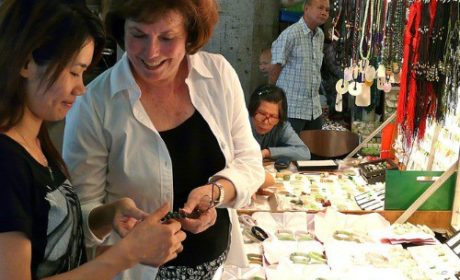Would you recognize one of the more common travel scams if it was happen to you or another traveler? All it takes is a little distraction and your purse, wallet or camera have been stolen. Today, we have advice for you from Leyla Giray, an experienced solo woman traveler. In fact she’s written a book, Women on the Road: the essential guide for baby boomer travel that offers advice on how to avoid travel scams among many other topics important to solo boomer travelers:
The joy of travel includes the elation of discovery, of making new friends and visiting places that don’t look like home. Engaging with local people is a large part of that charm, at least for me, and most of the time we both come away from the encounter having gained something.
On rare occasions, however, they gained a bit more than I had bargained for. It doesn’t happen often, but once in a while someone, somewhere will try to take you for a ride in a travel scam. And they’ll succeed.
Travel does make us a bit more vulnerable—and as tourists, more visible. Even so, there’s every chance your trip will be entirely uneventful. Just in case, though, being on your guard will be the best defense against that occasional encounter with deceit.
Possibly the most common travel scams involve getting lost: the hapless tourist is taken for a ride and overcharged by a taxi or similar transport. Close behind is the broken taxi meter trick. These are irritating but relatively harmless. Try to look at your map and find out where you’re going ahead of time and you won’t look like such an easy mark.
Another common scam is product substitution: you buy one thing, you get another, from a Turkish carpet to precious stones (which are in reality cut glass) to prescription drugs. I once bought a beautiful white sheepskin. The seller kindly took it to the back room to wrap it and when I got home, the white sheep had turned partly brown. Lesson learned.

Travel scams don’t have to be complicated. In crowded venues thieves scan outdoor cafes to check out the back seats of chairs, where unsuspecting women hang their purse. Don’t be surprised if it’s gone when you turn around. Keep your belongings where you can see them or better yet, attached to you or a chair or table leg.
Beware of any ATM transactions. If someone wants money, hanging around an ATM machine may be the fastest way to get yours. So please, use ATM machines that are indoors, don’t withdraw large sums all at once and go with someone. Once you have your money, don’t keep it all together. Put your daily spending allowance into your purse, and hide the rest in a money belt. (This is where you should also be keeping your passport and tickets if you don’t have a hotel safe.)
Your money itself isn’t immune to scamming. In countries with low-value currency and small denominations, check each bill before leaving to make sure nothing has been substituted.
One last warning: if you’re buying a Rolex on the street for $100, it’s not a Rolex. Period. The same for a $5 Lacoste or Polo shirt, or a $50 Vuitton bag. And if you buy, remember that some countries have heavy penalties for importing counterfeit goods. It could turn out to be far more expensive than purchasing the real thing.

Travel scams that aren’t not so simple
Dishonesty isn’t always this simple and straightforward and sometimes is aimed at people rather than at their things.
Misrepresentation is a travel scam that’s particularly hurtful because it violates your trust, such as when someone poses as a beggar, tugging at your compassion with a lie. Whether you give to beggars is a personal decision, but please never give to children. They might be trafficked by organized crime, placed along your path purely to stoke your pity. Why should parents work or send their kids to school when they can make so much more money turning the little ones out to beg? As long as you give, children will beg.
Another type of deception involves feigned friendship, like the nice young man in a small Ethiopian town who invited me home to meet his family—and promptly charged me for entering his house.
And finally, if a gorgeous young thing says life isn’t worth living without you… well… I suppose it could be true… but a little suspicion right about now could be in order.
Leyla Giray’s new e-book Women on the Road: the essential guide for baby-boomer travel is now available online. Find Leyla on Facebook or on her website, Women on the Road.
Have you been bamboozled by one of these travel scams? Join the conversation at the My Itchy Travel Feet page on Facebook or send us an email with your comments or questions.
I have included an Amazon Link to Women on the Road: the essential guide for baby boomer travel for your convenience. However My Itchy Travel Feet does receive a small percentage for purchases made at Amazon.com.



